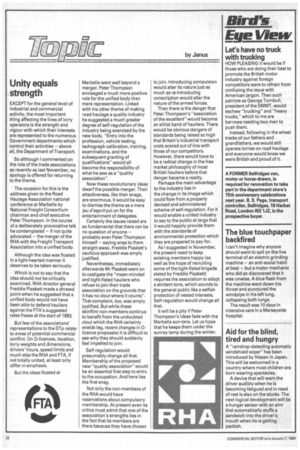Unity equals strength
Page 26

If you've noticed an error in this article please click here to report it so we can fix it.
EXCEPT for the general level of industrial and commercial activity, the most important thing affecting the lives of lorry operators is the strength and vigour with which their interests are represented to the numerous Government departments which control their activities — above all, the Department of Transport.
So although I commented on the role of the trade associations as recently as last November, no apology is offered for returning to the theme.
The occasion for this is the address given to the Road Haulage Association national conference at Marbella by National Freight Consortium chairman and chief executive Peter Thompson. In the course of a deliberately provocative talk he contemplated — if not quite advocated — the merger of the RHA with the Freight Transport Association into a unified body.
Although the idea was floated in a light-hearted manner it deserves to be taken seriously.
Which is not to say that the idea should not be critically examined. RHA director-general Freddie Plaskett made a shrewd point when he suggested that a unified body would not have been able to defend hauliers against the FTA's suggested rates freeze at the start of 1983.
But few of the associations' representations to the DTp relate to areas of potential commercial conflict. On 0-licences, taxation, lorry weights and dimensions, drivers' hours, speed limits and much else the RHA and ETA, if not totally united, at least only differ in emphasis.
But the ideas floated at Marbella went well beyond a merger. Peter Thompson envisaged a much more positive role for the unified body than mere representation. Linked with his other theme of making road haulage a quality industry he suggested a much greater degree of self-regulation of the industry being exercised by the new body. "Entry into the profession, vehicle testing, tachograph calibration, training, examinations, and the subsequent granting of qualifications" would all become the responsibility of what he saw as a "quality association".
Now these revolutionary ideas dwarf the possible merger. Their attactiveness, like their snags, are enormous. It would be easy to dismiss the theme as a mere jeu d'esprit put on for the entertainment of delegates.
Certainly the issues raised are so fundamental that there can be no question of anyone — probably even Peter Thompson himself — saying snap to them straight away. Freddie Plaskett's cautious approach was amply justified.
Nevertheless, immediately afterwards Mr Plaskett went on to castigate the "mean-minded and tight-fisted hauliers who refuse to join their trade association on the grounds that it has no clout where it counts". That complaint, too, was amply justified. But while these skinflint non-members continue to benefit from the undoubted clout which the RHA certainly wields teg, recent changes in 0licence proposals) it is difficult to see why they should suddenly feel impelled to join.
Self-regulation would presumably change all that. Membership of the proposed new "quality association" would be an essential first step to entry to the occupation. And here lies the first snag.
Not only the non-members of the RHA would have reservations about compulsory membership. At present even its critics must admit that one of the association's strengths lies in the fact that its members are there because they have chosen to join. Introducing compulsion would alter its nature just as much as re-introducing conscription would alter the nature of the armed forces.
Then there is the danger that Peter Thompson's "association of the excellent" would become an elitist band of hauliers. There would be obvious dangers of standards being raised so high that Britain's industrial transport costs soared out of line with those of our competitors. However, there would have to be a radical change in the free market philosophy of most British hauliers before that danger became a reality.
Perhaps the main advantage to the industry lies in the change in its image which could flow from a properly devised and administered scheme of self-regulation. For it would enable a united industry to say to the public at large that it would happily provide them with the standards of environmental protection which they are prepared to pay for.
As I suggested in November, the present need to keep existing members happy (as well as the hope of recruiting some of the tight-fisted brigade slated by Freddie Plaskett) requires the association to adopt a strident tone, which sounds to the general public like a selfish protection of vested interests. Self-regulation would change all that.
It will be a pity if Peter Thompson's ideas fade with the Marbella sun-tans. Let us hope that he keeps them under the sunray lamp during the winter.










































































